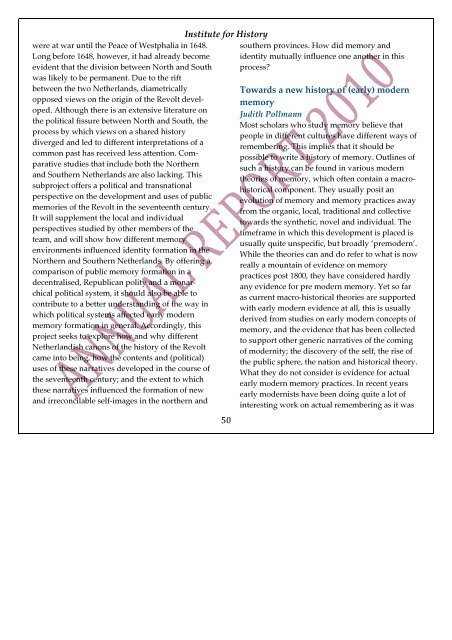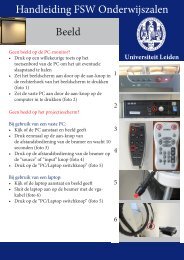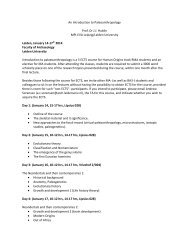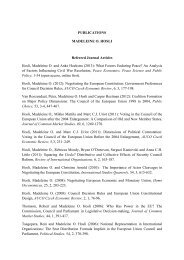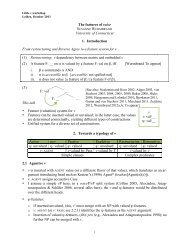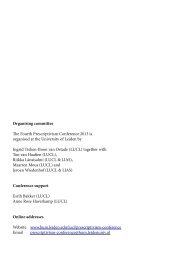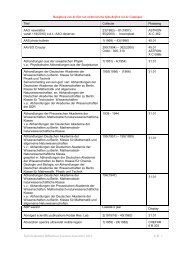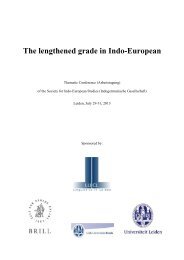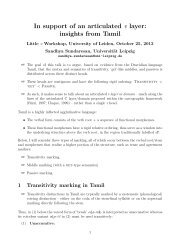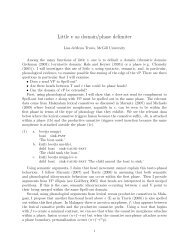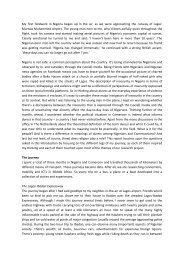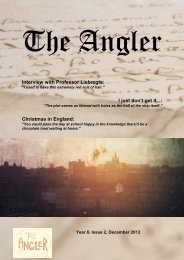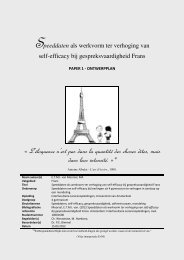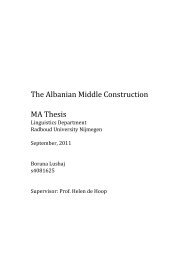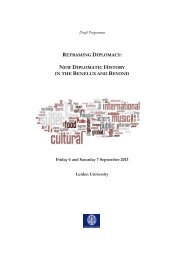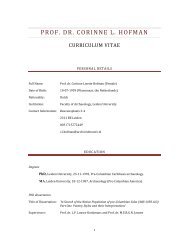Institute for History Annual Report 2010 - O - Universiteit Leiden
Institute for History Annual Report 2010 - O - Universiteit Leiden
Institute for History Annual Report 2010 - O - Universiteit Leiden
Create successful ePaper yourself
Turn your PDF publications into a flip-book with our unique Google optimized e-Paper software.
were at war until the Peace of Westphalia in 1648.<br />
Long be<strong>for</strong>e 1648, however, it had already become<br />
evident that the division between North and South<br />
was likely to be permanent. Due to the rift<br />
between the two Netherlands, diametrically<br />
opposed views on the origin of the Revolt developed.<br />
Although there is an extensive literature on<br />
the political fissure between North and South, the<br />
process by which views on a shared history<br />
diverged and led to different interpretations of a<br />
common past has received less attention. Comparative<br />
studies that include both the Northern<br />
and Southern Netherlands are also lacking. This<br />
subproject offers a political and transnational<br />
perspective on the development and uses of public<br />
memories of the Revolt in the seventeenth century.<br />
It will supplement the local and individual<br />
perspectives studied by other members of the<br />
team, and will show how different memory<br />
environments influenced identity <strong>for</strong>mation in the<br />
Northern and Southern Netherlands. By offering a<br />
comparison of public memory <strong>for</strong>mation in a<br />
decentralised, Republican polity and a monarchical<br />
political system, it should also be able to<br />
contribute to a better understanding of the way in<br />
which political systems affected early modern<br />
memory <strong>for</strong>mation in general. Accordingly, this<br />
project seeks to explore how and why different<br />
Netherlandish canons of the history of the Revolt<br />
came into being, how the contents and (political)<br />
uses of these narratives developed in the course of<br />
the seventeenth century; and the extent to which<br />
these narratives influenced the <strong>for</strong>mation of new<br />
and irreconcilable self-images in the northern and<br />
<strong>Institute</strong> <strong>for</strong> <strong>History</strong><br />
50<br />
southern provinces. How did memory and<br />
identity mutually influence one another in this<br />
process?<br />
Towards a new history of (early) modern<br />
memory<br />
Judith Pollmann<br />
Most scholars who study memory believe that<br />
people in different cultures have different ways of<br />
remembering. This implies that it should be<br />
possible to write a history of memory. Outlines of<br />
such a history can be found in various modern<br />
theories of memory, which often contain a macrohistorical<br />
component. They usually posit an<br />
evolution of memory and memory practices away<br />
from the organic, local, traditional and collective<br />
towards the synthetic, novel and individual. The<br />
timeframe in which this development is placed is<br />
usually quite unspecific, but broadly ‘premodern’.<br />
While the theories can and do refer to what is now<br />
really a mountain of evidence on memory<br />
practices post 1800, they have considered hardly<br />
any evidence <strong>for</strong> pre modern memory. Yet so far<br />
as current macro-historical theories are supported<br />
with early modern evidence at all, this is usually<br />
derived from studies on early modern concepts of<br />
memory, and the evidence that has been collected<br />
to support other generic narratives of the coming<br />
of modernity; the discovery of the self, the rise of<br />
the public sphere, the nation and historical theory.<br />
What they do not consider is evidence <strong>for</strong> actual<br />
early modern memory practices. In recent years<br />
early modernists have been doing quite a lot of<br />
interesting work on actual remembering as it was


